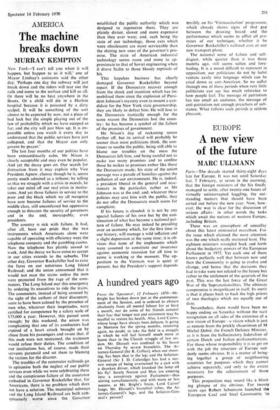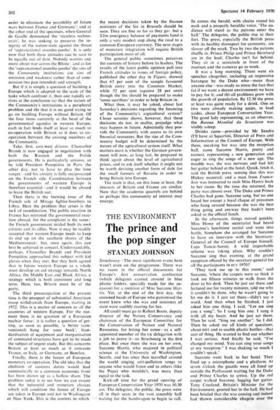EUROPE
A new view of the future
MARC ULLMANN
Paris—The decade started thirty-eight days late for Europe. It was not until Saturday last, 7 February, at seven in the morning, that the foreign ministers of the Six finally managed to settle, after twenty-one hours of virtually uninterrupted haggling, the out- standing matters that should have been sorted out before the new year. Now, how- ever, the way is clear for the discussion of serious affairs: in other words the tasks which await .the nations of western Europe, including Britain.
There was an atmosphere of unreality about this latest ministerial marathon. For the issue which claimed the most attention was the one which really mattered least. The eighteen ministers wrangled back and forth about the budgetary powers of the European Parliament in 1975. Yet each one of them knows perfectly well that between now and then the Community is going to evolve and change, and hence that the decisions they had to take were not related to the future but rather to the settlement of the quarrels of the past. This was the last foray of the Great War of the Supranationalities. The ultimate compromise is insignificant in itself. Its merit is that it places back to back the high priests of two theologies which are equally out of date.
Nevertheless. there would have been no happy ending on Saturday without the tacit recognition on all sides of the existence of a new vision of Europe—a vision which is just as remote from the prickly chauvinism of M Michel Debrd, the French Defence Minister, as it is from the hallucinatory federalism of certain Dutch and Italian parliamentarians. For those whose responsibility it is to get on with the job the structure of Europe sud- denly seems obvious. It is a matter of bring- ing together a group of neighbouring countries for purposes which they cannot achieve separately," and only to the extent necessary for the achievement of those purposes.
This proposition may sound like a blind- ing glimpse of the obvious. For twenty
years ago Robert Schumann launched the European Coal and Steel Community 'in order to eliminate the possibility of future wars between France and Germany'; and at the other end of the spectrum, when General de Gaulle denounced the 'stateless techno- crats', he was seeking to preserve the in- tegrity of the nation-state against the threat of 'supranational mumbo-jumbo'. It is only now that both these attitudes can be seen to be equally out of date. Nobody worries any more about war across the Rhine : and as for the 'supranational mumbo-jumbo' the sins of the Community institutions are sins of omission and weakness rather than of com- mission (no pun intended) and strength.
But if it is simply a question of building a Europe which is adapted to the scale of the
tasks which confront it, then one rapidly ar-
rives at the conclusion (a) that the nature of the Community's institutions is a peripheral problem and (b) that it is no good trying to go on building Europe without Britain. Of the four items currently at the head of the governmental agendas in western Europe, each in fact lends itself at least as much to co-operation with Britain as it does to co- operation between the existing members of the Community.
Take, first, east-west détente. Chancellor
Brandt is now engaged in negotiation with both the Russian and the Polish governments. He is particularly anxious, as he told President Pompidou in Paris the other day, not to have to play the lone ranger—and his anxiety is fully reciprocated on the French side. Coordination between the governments of western Europe is therefore essential—and it would be absurd to leave the British out.
Then there is the burning issue of the French sale of Mirage fighter-bombers to Libya. Here the problem that arises is the
lack of coordination. The public reaction in France has mirrored the governmental reac-
tion abroad, for the complaint is the same: the French government misled both its own citizens and its allies. Now it may be readily accepted that western Europe needs to keep its end up on the southern shores of the Mediterranean : but, once again, this can best be achieved in concert. Understandably, perhaps, Chancellor Brandt and President Pompidou approached this subject with kid gloves when they met. But they both agreed that in future western Europe as a whole must develop an aid strategy towards North Africa, the Middle East and Black Africa, a strategy which is both consistent and long term. Here, too, Britain must be of the party.
The third preoccupation at the present time is the prospect of substantial American troop withdrawals from Europe, starting in 1972. This is a matter of concern to all the countries of western Europe. For the mo- ment there is no question of a European nuclear force: it is rather a question of get- ting, as soon as possible, 'a better (con- ventional) bang for your buck'. Stan- dardisation of equipment and reorganisation of command-structures have got to be made the subject of urgent study. But this concerns Britain at least as much as it concerns France, or Italy, or Germany, or Benelux.
Finally, there is the future of European monetary co-operation. The old idea that the abolition of customs duties would lead automatically to a common economic front has been shown up as a hollow sham. The problem today is to see how we can ensure that the industrial and monetary choices which will condition the future of Europe are taken in Europe and not in Washington or New. iYork,. This is the context in which -'
the recent decisions taken by the finance ministers of the Six in Brussels should be seen. They are fine so far as they go: but a $2m emergency balance of payments fund is only a very modest step along the road to a common European currency. The next stages of monetary integration will require British participation most of all.
The general public sometimes perceives the currents of history before its leaders. The results of the latest public opinion poll into French attitudes to issues of foreign policy, published the other day in Figaro, showed that 63 per cent of the sample favoured British entry into the Common Market, while 52 per cent (against 28 per cent) though the Six should be prepared to make `some sacrifices' in order to help Britain in.
What then, it may be asked, about last Saturday's decisions regarding the financing of the Community's argicultural system? Closer scrutiny shows, however, that these decisions do not, in reality, prejudge what may happen in future. Admittedly they pro- vide the Community with access to its own financial resources. But the size of the Com- munity budget will be determined by the nature of the agricultural system itself. What matters most is whether the German govern- ment will now, at long last, be prepared to think again about the level of agricultural prices, and to ask itself whether it might not be worth devising another form of dole for the small farmers of Bavaria in order to bring Britain into Europe.
The truth is that, on this issue at least, the interests of Britain and France are similar. Now that the academic quarrels are behind us perhaps this community of interest may emerge.



































 Previous page
Previous page